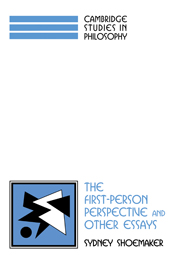Book contents
- Frontmatter
- Contents
- Preface
- Sources
- PART I SELF-KNOWLEDGE
- PART II QUALIA
- PART III MENTAL UNITY AND THE NATURE OF MIND
- PART IV THE ROYCE LECTURES: SELF-KNOWLEDGE AND “INNER SENSE”
- 10 Self-knowledge and “inner sense.” Lecture I: The object perception model
- 11 Self-knowledge and “inner sense.” Lecture II: The broad perceptual model
- 12 Self-knowledge and “inner sense.” Lecture III: The phenomenal character of experience
- References
- Index
10 - Self-knowledge and “inner sense.” Lecture I: The object perception model
Published online by Cambridge University Press: 16 January 2010
- Frontmatter
- Contents
- Preface
- Sources
- PART I SELF-KNOWLEDGE
- PART II QUALIA
- PART III MENTAL UNITY AND THE NATURE OF MIND
- PART IV THE ROYCE LECTURES: SELF-KNOWLEDGE AND “INNER SENSE”
- 10 Self-knowledge and “inner sense.” Lecture I: The object perception model
- 11 Self-knowledge and “inner sense.” Lecture II: The broad perceptual model
- 12 Self-knowledge and “inner sense.” Lecture III: The phenomenal character of experience
- References
- Index
Summary
The general topic of these lectures is the nature of our “introspective” knowledge of our own mental states, and, in particular, the question of whether this knowledge should be thought of as involving a kind of perception, an “inner sense” – whether it is appropriately conceived on a perceptual or observational model. The knowledge I have in mind is not, as you perhaps hoped, the difficult-to-get knowledge that arises from successfully following the Socratic injunction “Know thyself”; it is the humdrum kind of knowledge that is expressed in such remarks as “It itches,” “I'm hungry,” “I don't want to,” and “I'm bored.” In calling this knowledge “introspective,” I of course do not mean to be prejudging the question of whether it is perceptual or quasi-perceptual in nature; as will become apparent, my own view is at odds with the answer to that question which the etymology of that term rather naturally suggests.
Faced with the question of how someone knows something, the most satisfying answer we can be given is “She saw it.” Seeing is believing, the expression goes, and seeing is the paradigmatic explanation of knowing. No wonder, then, that many have been attracted by the idea that something like seeing explains that knowledge we have of our own minds. But while many philosophers have embraced an inner-sense model of self-knowledge, many others have found such a model profoundly misleading or mistaken.
Let me try to evoke some of the intuitions on which the issue turns. First, focus on some current sensation of yours – an itch or tingle or pain.
Information
- Type
- Chapter
- Information
- The First-Person Perspective and Other Essays , pp. 201 - 223Publisher: Cambridge University PressPrint publication year: 1996
Accessibility standard: Unknown
- 8
- Cited by
